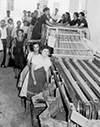Female employment in Democratic Spain and the Great Recession’s impact
Abstract
This article analyses under a gender perspective the Spanish labor market during the current stage of capitalism, which began in the 1970s, at the time Spain achieved democracy and was integrated in the European Union integration, as well as the changes that are taking place in the current recessive context. Based on the main theories and empirical evidence on the relationships between crises, economic cycles and gender participation in labour markets, the article examines the participation of women in the Spanish labour market during last four decades, with a focus on the structural aspects affecting supply and demand factors. The institutional framework and cultural changes that have accompanied this process of increasing women’s participation in employment are also studied. Finally, the consequences of last economic crisis in Spain on women and their job opportunities are examined, stressing the risk of being moving towards a new distributive and gender model.Downloads
Download data is not yet available.
Metrics
Views/Downloads
-
Abstract2191
-
PDF (Español (España))4358

29-12-2013
Gálvez Muñoz, L., & Rodríguez Modroño, P. (2013). Female employment in Democratic Spain and the Great Recession’s impact. Areas. International Social Science Journal, (32), 105–123. Retrieved from https://revistas.um.es/areas/article/view/192321
Artículos
The published works by this Journal are subject to the following terms:
1. The Publication Service of the University of Murcia (the Editor) owns the copyright of its publications. It promotes and allows its use under the indicated licence in Section 2.
© Servicio de Publicaciones, Universidad de Murcia, 2011
2. Papers are digitally published under the licence Creative Commons Reconocimiento-NoComercial-SinObraDerivada 3.0 España (legal text). They can be copied, used, disseminated, transferred and publically presented if: i) the author is quoted, as well as the original source of publication (Journal, editorial and URL); ii) they are not used for commercial purposes; iii) the licence of use is mentioned.
3. Auto-file Conditions. It is allowed and authors are encouraged to digitally disseminate their pre-print versions (versions prior to review) and/or post-print (reviewed version accepted for its publication) since it promotes its early diffusion and the corresponding increase of quotes and scope within the academic community. RoMEO Colour: green.

